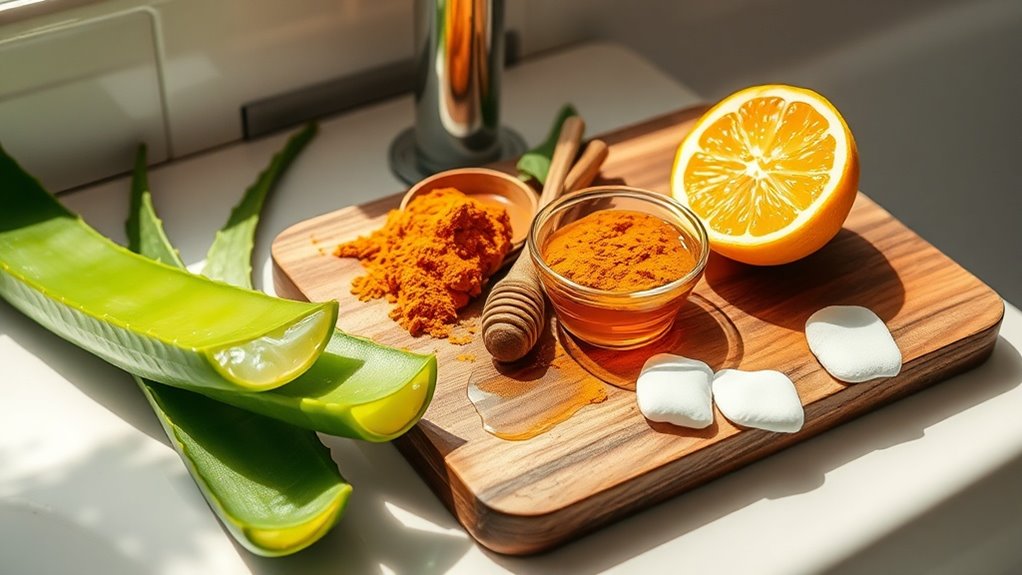Clear Up Pimples Naturally With These Easy Remedies
Imagine struggling with persistent acne and finding relief through natural remedies. By incorporating ingredients like tea tree oil and aloe vera into your skincare routine, you can effectively combat breakouts without harsh chemicals. Each remedy offers unique benefits that can soothe irritation and promote healing. Curious about how these simple solutions can transform your skin? Let’s explore the power of these natural ingredients and how they can help you achieve clearer skin.
The Power of Tea Tree Oil
When it comes to tackling blemishes, the effectiveness of tea tree oil stands out remarkably. This natural remedy contains terpinen-4-ol, known for its antibacterial properties, which can help clear pimples naturally. Studies show it reduces acne lesions without causing dryness, making it suitable for various skin types. Incorporating tea tree oil into your skincare routine can significantly improve your complexion. Additionally, applying diluted solutions can help minimize any potential sensitivity during use.
Harnessing the Benefits of Aloe Vera
Many people aren’t aware of the powerful soothing properties found in aloe vera, making it a fantastic natural remedy for acne.
Its anti-inflammatory and antibacterial qualities help reduce redness and inflammation while promoting healing.
Applying fresh aloe vera gel directly to your skin can hydrate and nourish, providing a calming effect.
Research supports its effectiveness, making it an essential addition to your skincare routine. Additionally, the antibacterial properties of ingredients like tea tree oil can further complement the effects of aloe vera in treating acne.
Using Honey as a Natural Acne Fighter
While aloe vera provides soothing relief for acne-prone skin, honey offers its own unique benefits as a natural acne fighter.
Its antibacterial properties help inhibit acne-causing bacteria, while its anti-inflammatory effects reduce redness and swelling. Additionally, honey acts as a natural humectant, drawing moisture to the skin and promoting healing for those with acne-prone skin. You can apply raw honey directly to blemishes or mix it with other ingredients like lemon juice for enhanced effectiveness.
Give it a try for clearer skin!
Green Tea: A Soothing Skin Solution
As you seek natural remedies for acne, consider green tea, which boasts powerful antioxidants and anti-inflammatory properties that can significantly benefit your skin.
Studies indicate that the catechins in green tea can reduce sebum production and inhibit the growth of acne-causing bacteria. Additionally, the antioxidants found in green tea help reduce redness and irritation, further promoting a smoother complexion.
Applying brewed green tea directly or using products infused with it can lead to calmer, clearer skin over time.
The Magic of Lemon Juice
Lemon juice boasts impressive antibacterial properties that can help combat the bacteria responsible for acne.
To effectively use this natural remedy, you’ll want to apply it carefully and consider various techniques for optimal results.
However, keep in mind the precautions necessary to avoid skin irritation, especially if you have sensitive skin.
Antibacterial Properties Explained
When considering natural remedies for acne, the antibacterial properties of lemon juice stand out as a powerful tool in your skincare arsenal.
Rich in citric acid, lemon juice helps combat bacteria that contribute to acne formation. Studies indicate that its antimicrobial properties can reduce inflammation and encourage healing, making it an effective option for enhancing your skin’s clarity and health.
Application Techniques Suggested
How can you effectively incorporate lemon juice into your skincare routine for acne treatment?
Start by diluting fresh lemon juice with equal parts water to prevent skin irritation.
Apply the mixture with a cotton ball directly onto blemishes, leaving it on for 10-15 minutes before rinsing.
Repeat this process once daily to take advantage of lemon’s natural antibacterial and astringent properties in reducing acne.
Precautions to Consider
While lemon juice can be an effective natural remedy for acne, it’s important to take certain precautions to avoid potential skin damage.
Always dilute lemon juice with water, as its acidity can irritate your skin.
Test it on a small patch first, and avoid sun exposure afterward to prevent photosensitivity.
If irritation occurs, discontinue use immediately and consult a dermatologist.
Exfoliation With Baking Soda
Exfoliation With Baking Soda
Exfoliating with baking soda offers a range of benefits, including its role as a gentle abrasive that can help remove dead skin cells and unclog pores.
To exfoliate effectively, mix baking soda with water to form a paste and apply it to your skin in circular motions. Natural ingredients like baking soda can enhance your skincare routine.
However, it’s essential to use this method cautiously, as over-exfoliation can lead to irritation and disrupt your skin’s natural barrier.
Benefits of Baking Soda
Baking soda offers an effective and natural solution for exfoliating your skin, helping to clear away dead cells and impurities that can contribute to pimples.
Its mild abrasiveness removes unwanted debris without irritating the skin. Additionally, baking soda balances your skin’s pH, promoting a clearer complexion.
Regular use can enhance skin texture, making it smoother and more radiant—ideal for maintaining healthy skin.
How to Exfoliate
To achieve smoother, clearer skin, you can incorporate baking soda into your exfoliation routine.
Mix two tablespoons of baking soda with one tablespoon of water to form a paste. Gently massage this mixture onto your damp face in circular motions for about one minute, then rinse thoroughly with warm water.
This process removes dead skin cells and reveals fresh skin underneath, promoting a healthier complexion.
Precautions When Using
When considering the use of baking soda for exfoliation, it’s essential to be aware of certain precautions to ensure your skin remains healthy and irritation-free.
Limit use to once or twice a week to prevent over-exfoliation.
Always perform a patch test to check for allergic reactions, and avoid using it on open wounds or sensitive areas to reduce the risk of irritation.
